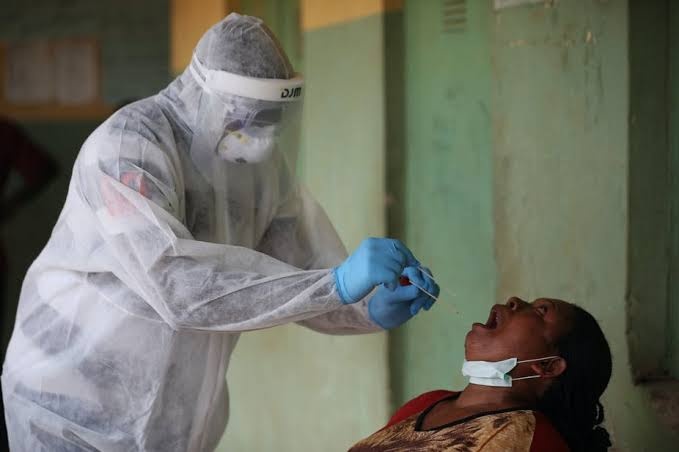#COVID-19: Six In Seven Cases Go Undetected In Africa – WHO
The assessment prepared by the World Health Organisation found that as of October, the cumulative number of COVID-19 infections is estimated to be 59 million in Africa, which is seven times more than the over 8 million cases reported.

The World Health Organisation (WHO), in a new assessment, has said only 14.2 per cent – or one in seven – COVID-19 infections are being detected in Africa.
It found that as of Sunday, Oct. 10, 2021, the cumulative number of COVID-19 infections was estimated to be 59 million in Africa, which is seven times more than the over 8 million cases reported.
The WHO analysis used the COVID-19 calculator developed by Resolve to Save Lives, which estimated infections based on reported number of cases, deaths, and infection fatality data in population-based studies.
It shows that since the start of the pandemic, more than 70 million COVID-19 tests have been reported by African countries, which is a fraction of the continent’s 1.3 billion people.
Dr Matshidiso Moeti, WHO Regional Director for Africa who spoke during a virtual press conference facilitated by APO Group on Thursday, Oct. 14, said COVID-19 diagnosis in Africa has focused on people reporting to health facilities with symptoms, and testing to arriving and departing international travellers. This has led to under-reporting given the high percentage of asymptomatic cases on the continent.
According to her, there have now been over 8.4 million COVID-19 cases recorded in Africa, including 214, 000 deaths. Vaccination rates remain low.
“Only 30 per cent of the continent’s 54 nations are fully vaccinated, which is 10 per cent of their population against the disease–compared with almost 90 per cent of high-income countries.”
“Meanwhile, just under half of the African countries that have received COVID-19 vaccines have fully vaccinated just 2% or less of their populations.”
The WHO Regional Director further stated in the absence of enough vaccines, a more proactive community testing effort is important for reducing transmission in African countries where a relatively youthful population is contributing to a high rate of asymptomatic infections.
“Estimates show that between 65% and 85 per cent of COVID-19 infections in Africa generate few or no symptoms. As a result, most Africans infected with the disease do not seek out treatment in local health facilities where most testing now occurs.”
“Yet, asymptomatic individuals are playing a key role in facilitating transmission to vulnerable individuals who can suffer severe disease or death.”
To reverse the situation and curb transmission, the WHO Regional Director announced a new initiative to enhance community screening for COVID-19 in eight countries.
According to her, the countries participating in the programme are Burundi, Côte d’Ivoire, Democratic Republic of the Congo, Guinea-Bissau, Mozambique, Republic of the Congo, Senegal and Zambia.
“The programme aims to reach more than 7 million people with rapid diagnostic tests in the next year,” Moet revealed.
“With limited testing, test numbers have been rising in Africa, but this community-based initiative is a radically new approach which should help significantly raise detection rates. More testing means rapid isolation, less transmission and more lives saved through targeted action.”
To begin implementation, WHO has donated US$ 1.8 million to the eight countries and also deployed teams in local communities to seek out contacts of people who have tested positive for COVID-19 and offer antigen rapid diagnostic tests.
In addition to her statement, the initiative will use a ring strategy, which was pioneered successfully in the eradication of smallpox in the latter half of the 20th century to vaccinate people who are most likely to be infected. The ring approach will target people living inside a circle of 100 metres radius around each new confirmed case to prevent further spread of the disease.
“Each household within the 100 metres radius will receive hygiene kits including face masks and hand sanitizers and anyone who tests positive will be assessed for the severity of their condition to determine whether they should receive home-based care or need to be transferred to designated COVID-19 treatment centres.” she said.
The programme, WHO said, aims to increase the testing capacity in each participating country by 40%, ensuring they reach the WHO recommended benchmark of 10 tests performed per 10 000 people weekly. Currently, around 20 countries — more than a third of African countries — do not reach this benchmark.
Testing will be carried out on a voluntary basis and will be conducted using WHO-approved antigen-based rapid diagnostic tests, she said, which can produce results on-site in as little as 15 minutes and can be administered with minimal training.
“Public health authorities in Africa have so far been rightly focused on managing the cases coming into treatment centres and hospitals, but now is the time to go on the offensive against COVID-19, and work with local communities to break transmission chains and stop wider outbreaks from happening.”
Support Our Journalism
There are millions of ordinary people affected by conflict in Africa whose stories are missing in the mainstream media. HumAngle is determined to tell those challenging and under-reported stories, hoping that the people impacted by these conflicts will find the safety and security they deserve.
To ensure that we continue to provide public service coverage, we have a small favour to ask you. We want you to be part of our journalistic endeavour by contributing a token to us.
Your donation will further promote a robust, free, and independent media.
Donate HereStay Closer To The Stories That Matter




